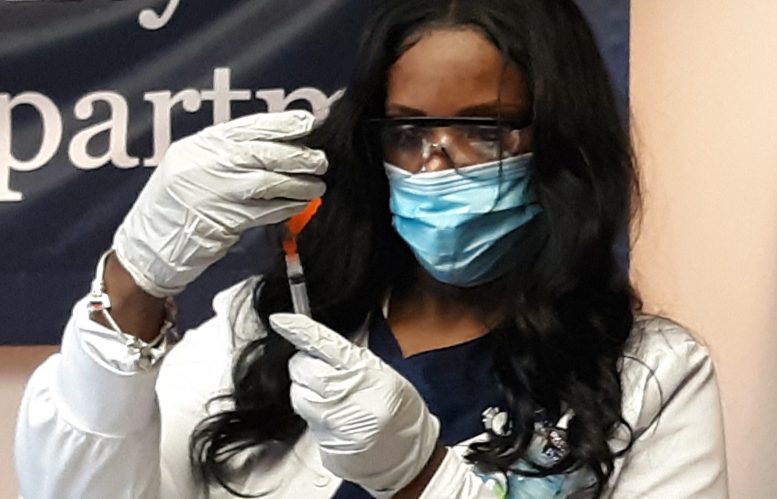A little more than a month ago, when Ohio administered its first coronavirus vaccine, hopes were high and Gov. Mike DeWine called it a “great day” in the history of the state.
But on Tuesday, the pace of vaccinations continued to fall far short of projections and new hurdles continued to pop up.
Most recently, drug distributing giant McKesson failed to notify 155 entities administering the Moderna vaccine that its Wednesday delivery would be delayed by a day, DeWine said. McKesson’s apparent failure to live up to its notification obligation again left officials scrambling to deliver vaccines even as the national death toll eclipsed 400,000 and new, more-transmissible variants of the coronavirus were popping up.
“If you’re a pharmacy or you’re a health department or you’re a doctor and you think you’re going to get a shipment in one day and vaccinate the next, you’ve got to schedule the appointments, you’ve got to call all those people and reschedule them,” DeWine said, describing the problem McKesson caused.
The governor estimated that each location had to make 50 to 200 such calls. He added that such changes are “very inconvenient” for elderly people who might have to make special arrangements to be vaccinated.
McKesson spokesman David Matthews said that the problems stemmed from the way the vaccines were packed during shipment.
“McKesson learned on Monday, Jan. 18, that certain deliveries of Moderna vaccines shipped on Sunday, Jan. 17, arrived at the sites of administration colder than the low end of the manufacturer’s stated temperature range,” Matthews said in an email. “McKesson is replacing these vaccines. We also identified the root cause of the issue — some of the gel packs used to maintain appropriate temperatures during shipping were found to be too cold — and have taken steps to prevent this from occurring in the future.”
He added that the company checked doses slated for shipment on Monday and discovered that “a small percentage of those shipments were also impacted by the gel pack issue” and would ship replacements within 24 hours.
As for notification, Matthews said, “McKesson worked directly with the CDC to notify each state awardee that was expecting a shipment about the delay.”
The company has had issues with the state in the past. The company enjoyed massive tax breaks from the Ohio, only to be sued by DeWine when he was attorney general in 2018 for allegedly allowing the opioids it handled to be diverted into illicit channels.
DeWine was asked if he would seek to sanction McKesson for creating more vaccine headaches by not fulfilling its notification responsibilities.
“I don’t know about sanctions,” he said. “We complained about it… and said that when there’s going to be a delay they need to notify.”
The problem follows many others in the vaccine rollout.
Last week — days after President-elect Joe Biden said he’d release all available vaccine instead of holding some back for second doses — President Trump’s Health and Human Services Secretary, Alex Azar, announced the government would release the stockpile it had been holding back.
Turns out there was no stockpile. Some governors complained that the inconsistent stories they were hearing from the Trump administration were making the already difficult task of vaccine distribution even worse.
For his part, DeWine said that he didn’t expect much increase in the number of doses flowing to Ohio until March, when Johnson & Johnson’s one-dose vaccine will hopefully be approved.
“We’re trying to do a lot of things without enough vaccines,” DeWine said.
One upshot is that most Ohioans are going to have to wait for an undetermined amount of time to be vaccinated.
First in line were health care workers and nursing home residents and staff. Vaccinating those populations with a first dose is expected to be largely complete this week, DeWine said.
Next in line are people with serious medical vulnerabilities and Ohioans 80 and older. But hundreds were turned awayTuesday from a Madison County vaccination site due to lack of supply, the Columbus Dispatch reported.
DeWine wants to expand vaccine availability to Ohioans 65 and over, but he conceded Tuesday that it could some time before he can. For others, the wait will be longer.
“We know that at the rate this vaccine is coming in, it’s going to be a long time before we get through” the groups the state has already prioritized, DeWine said.
The pace is starkly different from the one promised by U.S. Surgeon General Jerome Adams exactly one month ago when he held a joint press conference with DeWine.
He promised that 20 million Americans would be vaccinated by the end of the year and that there was no need to use the Defense Production Act to maximize production of the two vaccines that so far have been permitted. The Trump administration’s self-imposed deadline passed two weeks ago and only about 13 million Americans have received at least a first dose of the vaccine.
DeWine in the past has praised the Trump’s coronavirus efforts that many others have found lacking. On Tuesday he was asked to evaluate Operation Warp Speed, the administration’s effort to develop and distribute the vaccine.
“I think someone else is going to have to write that story,” DeWine said.
***
Also from Ohio Capital Journal:
Majority of K-12 schools agree to in-person schooling by March, per state vaccination condition
As plans form for the vaccination of school personnel, Gov. Mike DeWine said an overwhelming majority of districts have agreed to have at least partial in-person instruction in place by March 1.
Public school districts were surveyed by the state asking whether they would be willing and able to conduct in-person classes by March 1 in order to receive the vaccinations.
“I’m glad to report, as of today, 96% of public school districts have committed to returning to school at least partially in person by March 1,” DeWine said. “Ninety-six percent so far have told us yes, we’re willing to do this; yes, we can do that.”
Educational service centers, local service providers for school districts, are partnered with districts and will communicate with them this week to confirm final plans, according to DeWine. Those plans will include the decision from schools as to whether they will partner with a retail pharmacy (secured by the state) or with their local health department for vaccine administration.
Those vaccinations, which will be given to adult personnel in “closed clinics” specifically for staff, and distribution should begin starting Feb. 1. READ MORE
Missouri Republican to delay Senate confirmation of Biden’s pick for Homeland Security
WASHINGTON — U.S. Sen. Josh Hawley will object to the rapid confirmation vote planned for President-elect Joe Biden’s pick to lead the Department of Homeland Security, part of the national security team that was expected to be confirmed Wednesday.
Hawley, a Missouri Republican, announced his opposition to Alejandro Mayorkas following Tuesday’s hearing on the DHS nominee, who would take office amid law enforcement warnings about potential violence in D.C. and state capitals following the Jan. 6 pro-Trump attack on the U.S. Capitol.
Hawley said in a statement that Mayorkas “has not adequately explained how he will enforce federal law and secure the southern border given President-elect Biden’s promise to roll back major enforcement and security measures.”
The objection from Hawley — who has drawn scrutiny for leading objections to the Electoral College certification of Biden as president — is likely to delay the DHS chief’s confirmation for a few days under Senate procedures, although Mayorkas is still expected to be approved. It comes after a hearing in which lawmakers from both parties underscored the significant challenges facing the massive agency tasked with ensuring safety from a range of foreign, domestic and cyber threats. READ MORE





